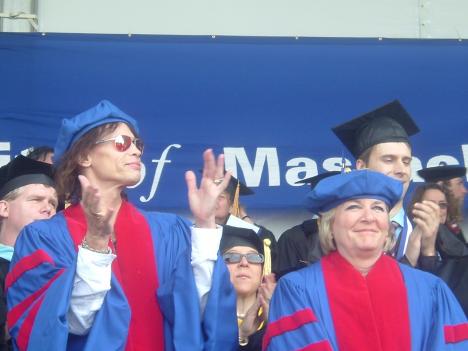When I call Myself a Feminist
March 24, 2005
When I call myself a feminist, it is risky. The risk is subtle and unending, and it is difficult. There is no identifiable threat posed by the language, but rather what the language does and what it makes me do. The risk is embedded in the actions it leads me to value and participate in. For years and years I would not attribute that label to myself, I would deny and deny what I was and am. I live in a culture where feminism is considered, particularly by those in power, to be a thing of the past-a movement that had its day and whose participants have already won or lost their respective battles. The rhetoric of self-esteem in the form of girl power and slogans like “cutie pie” and “angel” co-opted, marketed and printed on T-shirts have become safer and more acceptable. So to call myself a feminist is almost like opening a wound in our culture that has never healed.
The term “feminist” conjures up false cultural stereotypes of bra-burning man-haters and other such nonsense, when in fact to be a feminist is really to be a humanist.
My definition of feminism is something that constantly shifts and rearranges as I learn and experience new things. The adaptability of the term and the beliefs attached make feminism dangerous. The assertion that women and men should be treated as equals undermines a hierarchy which is essential to the basis of our culture. The social construction of what is deemed “masculine” includes power, authority, physical strength and rationality and attributes those qualities to men, leaving weakness, deference to authority and excessive emotionality to be socially constructed as “feminine.” Feminism demands a revision of this binary male/female relationship. In effect, it seeks to remove the keystone that sits beneath many other forms of oppression.
I remember when I first admitted I was a feminist. It was in the fall of 2001 and the world had become a very scary place. It was only a few weeks after the tragedy of the Twin Towers in New York City-everything seemed topsy-turvy. Muslim men were being picked up off the streets and shuffled off to undisclosed locations and women’s rights in Afghanistan were being used as part of the rhetoric for war. I was scared.
One night, I attended a lecture at M.I.T. with one of my fellow students from UMB. There were three women who spoke to a diverse and attentive crowd. Suheir Hamad, a Palestinian-American woman poet really reached me with her words. She read a poem called “First Writing Since.” That same poem had appeared in Sojourner just weeks before the event. It was a lament detailing the chaos in New York, her hometown.
There were two other women artists who spoke as well who detailed their brands of feminism. They spoke of how they lived feminism in their everyday lives and how that perspective influenced their work. After I left that lecture hall, I never denied myself the title of feminist again.
The power of language is something I have always felt. Somehow, calling myself a feminist became a bridge across so many issues I cared about.
There is something defiant about the term itself. By asserting the visibility of women through the use of this type of language, I was calling into question the ideals on which so many forms of oppression are based.
The term feminist challenges the status quo and demands new perspective. All that with one little word. That one little word has led me to so much discovery, important struggle, and learning that it has become infinitely more than a word for me.
Once I embraced the label of feminist, I could begin to negotiate with all the contradictions and connections which this new language brought to light.
I began taking more Women’s Studies courses at UMB. I continued reading feminist theory and discovering the applications of such theory. I met more and more women, and some men, who lived feminism in their everyday lives. In every aspect of my life I started to see the ways in which feminism could serve as a basis for thoughtful learning and activism. I attended conferences about Reproductive Rights and learned of the many intersections between feminism and social justice movements.
In 2003, I became involved with an anti-war coalition at UMB which staged silent protest against the Iraq war and held meetings and events to further educate ourselves and our fellow students about what was happening in our world.
I began working in the Queer Student Center at UMB, discussing and realizing the inextricable links between queer liberation and women’s rights.
The more I learned about feminist theory, the more I felt at home within the category of feminism.
I decided to declare Women’s Studies as a second major and I am currently writing my senior honors thesis under that department. Also, I serve as the student coordinator for UMB’s undergraduate Women’s Center.
Discovering my feminism has literally changed the course of my life, by rerouting my educational goals and aspirations. Four years ago, I was still scared of the word “feminist,” precisely because it was risky to admit to myself and those around me, that it described me perfectly.





















































